Psychological Contract: Developing Sustainable Leadership at Tesco
VerifiedAdded on 2023/06/14
|8
|2451
|403
Essay
AI Summary
This essay critically discusses how understanding the psychological contract can aid in developing sustainable leadership within an organization, focusing on Tesco as a case study. The psychological contract, defined as the mutual beliefs, perceptions, and informal arrangements between employers and employees, is crucial for maintaining productivity and employee retention. The essay explores various theories, including social exchange theory and Chris Argyris' theory, to highlight how these contracts shape behavior and expectations. Furthermore, team-building theories like Tuckman's model and Belbin's theory are discussed in relation to fostering effective teamwork and sustainable leadership. Behavioral theories are also examined, emphasizing the importance of learning and adapting leadership behaviors to enhance performance. The essay concludes that understanding and effectively managing psychological contracts can significantly contribute to creating a sustainable leadership environment that benefits stakeholders, employees, and the organization's long-term goals.
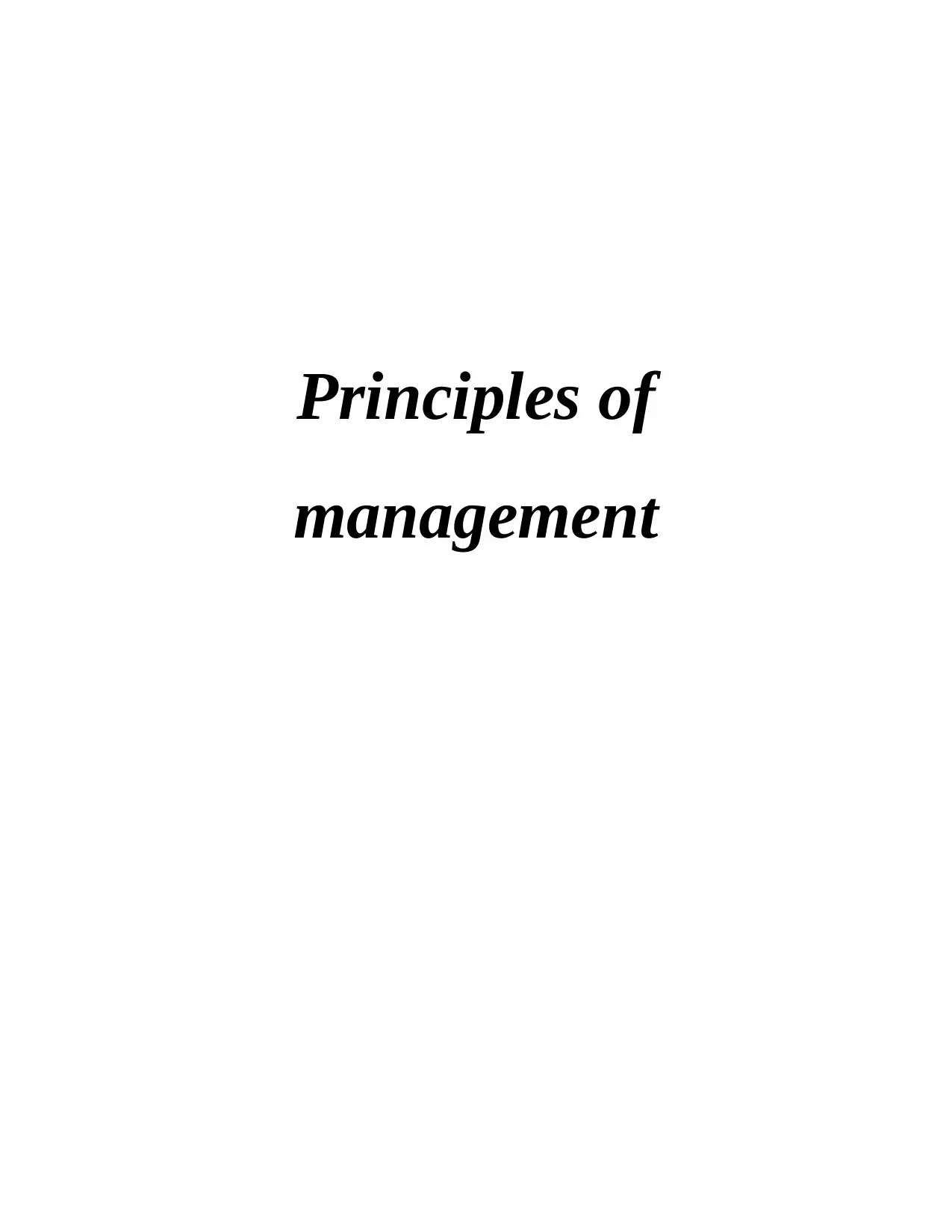
Principles of
management
management
Paraphrase This Document
Need a fresh take? Get an instant paraphrase of this document with our AI Paraphraser
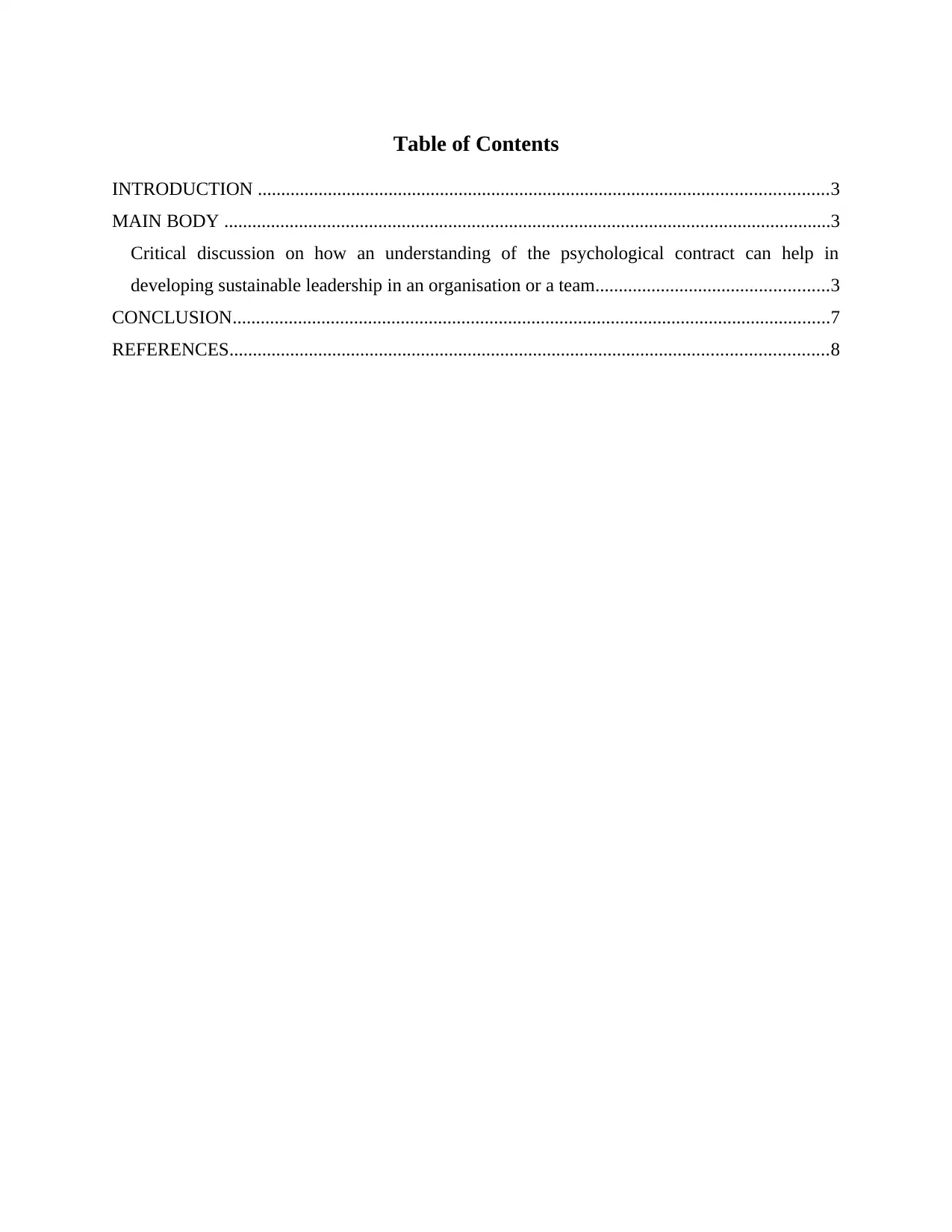
Table of Contents
INTRODUCTION ..........................................................................................................................3
MAIN BODY ..................................................................................................................................3
Critical discussion on how an understanding of the psychological contract can help in
developing sustainable leadership in an organisation or a team..................................................3
CONCLUSION................................................................................................................................7
REFERENCES................................................................................................................................8
INTRODUCTION ..........................................................................................................................3
MAIN BODY ..................................................................................................................................3
Critical discussion on how an understanding of the psychological contract can help in
developing sustainable leadership in an organisation or a team..................................................3
CONCLUSION................................................................................................................................7
REFERENCES................................................................................................................................8
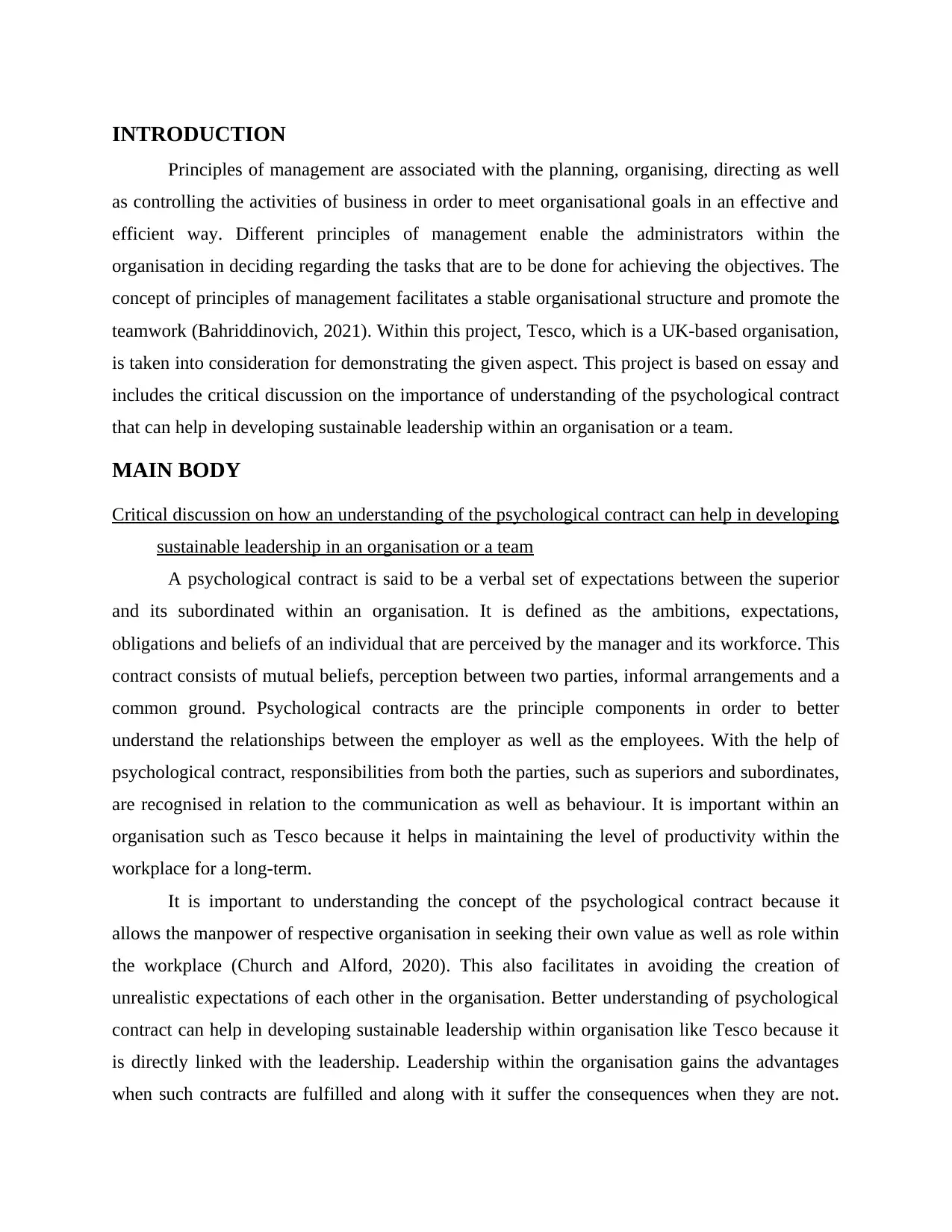
INTRODUCTION
Principles of management are associated with the planning, organising, directing as well
as controlling the activities of business in order to meet organisational goals in an effective and
efficient way. Different principles of management enable the administrators within the
organisation in deciding regarding the tasks that are to be done for achieving the objectives. The
concept of principles of management facilitates a stable organisational structure and promote the
teamwork (Bahriddinovich, 2021). Within this project, Tesco, which is a UK-based organisation,
is taken into consideration for demonstrating the given aspect. This project is based on essay and
includes the critical discussion on the importance of understanding of the psychological contract
that can help in developing sustainable leadership within an organisation or a team.
MAIN BODY
Critical discussion on how an understanding of the psychological contract can help in developing
sustainable leadership in an organisation or a team
A psychological contract is said to be a verbal set of expectations between the superior
and its subordinated within an organisation. It is defined as the ambitions, expectations,
obligations and beliefs of an individual that are perceived by the manager and its workforce. This
contract consists of mutual beliefs, perception between two parties, informal arrangements and a
common ground. Psychological contracts are the principle components in order to better
understand the relationships between the employer as well as the employees. With the help of
psychological contract, responsibilities from both the parties, such as superiors and subordinates,
are recognised in relation to the communication as well as behaviour. It is important within an
organisation such as Tesco because it helps in maintaining the level of productivity within the
workplace for a long-term.
It is important to understanding the concept of the psychological contract because it
allows the manpower of respective organisation in seeking their own value as well as role within
the workplace (Church and Alford, 2020). This also facilitates in avoiding the creation of
unrealistic expectations of each other in the organisation. Better understanding of psychological
contract can help in developing sustainable leadership within organisation like Tesco because it
is directly linked with the leadership. Leadership within the organisation gains the advantages
when such contracts are fulfilled and along with it suffer the consequences when they are not.
Principles of management are associated with the planning, organising, directing as well
as controlling the activities of business in order to meet organisational goals in an effective and
efficient way. Different principles of management enable the administrators within the
organisation in deciding regarding the tasks that are to be done for achieving the objectives. The
concept of principles of management facilitates a stable organisational structure and promote the
teamwork (Bahriddinovich, 2021). Within this project, Tesco, which is a UK-based organisation,
is taken into consideration for demonstrating the given aspect. This project is based on essay and
includes the critical discussion on the importance of understanding of the psychological contract
that can help in developing sustainable leadership within an organisation or a team.
MAIN BODY
Critical discussion on how an understanding of the psychological contract can help in developing
sustainable leadership in an organisation or a team
A psychological contract is said to be a verbal set of expectations between the superior
and its subordinated within an organisation. It is defined as the ambitions, expectations,
obligations and beliefs of an individual that are perceived by the manager and its workforce. This
contract consists of mutual beliefs, perception between two parties, informal arrangements and a
common ground. Psychological contracts are the principle components in order to better
understand the relationships between the employer as well as the employees. With the help of
psychological contract, responsibilities from both the parties, such as superiors and subordinates,
are recognised in relation to the communication as well as behaviour. It is important within an
organisation such as Tesco because it helps in maintaining the level of productivity within the
workplace for a long-term.
It is important to understanding the concept of the psychological contract because it
allows the manpower of respective organisation in seeking their own value as well as role within
the workplace (Church and Alford, 2020). This also facilitates in avoiding the creation of
unrealistic expectations of each other in the organisation. Better understanding of psychological
contract can help in developing sustainable leadership within organisation like Tesco because it
is directly linked with the leadership. Leadership within the organisation gains the advantages
when such contracts are fulfilled and along with it suffer the consequences when they are not.
⊘ This is a preview!⊘
Do you want full access?
Subscribe today to unlock all pages.

Trusted by 1+ million students worldwide
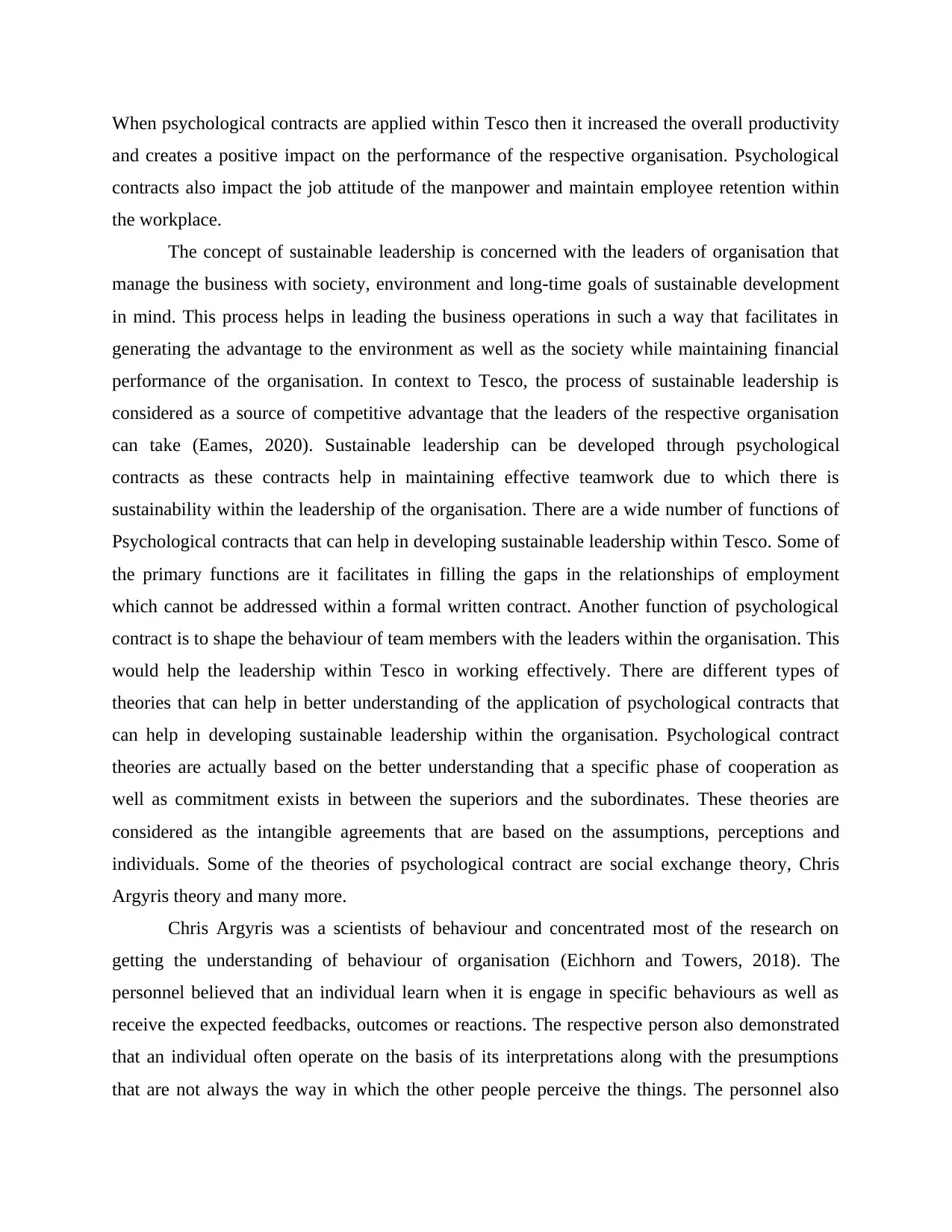
When psychological contracts are applied within Tesco then it increased the overall productivity
and creates a positive impact on the performance of the respective organisation. Psychological
contracts also impact the job attitude of the manpower and maintain employee retention within
the workplace.
The concept of sustainable leadership is concerned with the leaders of organisation that
manage the business with society, environment and long-time goals of sustainable development
in mind. This process helps in leading the business operations in such a way that facilitates in
generating the advantage to the environment as well as the society while maintaining financial
performance of the organisation. In context to Tesco, the process of sustainable leadership is
considered as a source of competitive advantage that the leaders of the respective organisation
can take (Eames, 2020). Sustainable leadership can be developed through psychological
contracts as these contracts help in maintaining effective teamwork due to which there is
sustainability within the leadership of the organisation. There are a wide number of functions of
Psychological contracts that can help in developing sustainable leadership within Tesco. Some of
the primary functions are it facilitates in filling the gaps in the relationships of employment
which cannot be addressed within a formal written contract. Another function of psychological
contract is to shape the behaviour of team members with the leaders within the organisation. This
would help the leadership within Tesco in working effectively. There are different types of
theories that can help in better understanding of the application of psychological contracts that
can help in developing sustainable leadership within the organisation. Psychological contract
theories are actually based on the better understanding that a specific phase of cooperation as
well as commitment exists in between the superiors and the subordinates. These theories are
considered as the intangible agreements that are based on the assumptions, perceptions and
individuals. Some of the theories of psychological contract are social exchange theory, Chris
Argyris theory and many more.
Chris Argyris was a scientists of behaviour and concentrated most of the research on
getting the understanding of behaviour of organisation (Eichhorn and Towers, 2018). The
personnel believed that an individual learn when it is engage in specific behaviours as well as
receive the expected feedbacks, outcomes or reactions. The respective person also demonstrated
that an individual often operate on the basis of its interpretations along with the presumptions
that are not always the way in which the other people perceive the things. The personnel also
and creates a positive impact on the performance of the respective organisation. Psychological
contracts also impact the job attitude of the manpower and maintain employee retention within
the workplace.
The concept of sustainable leadership is concerned with the leaders of organisation that
manage the business with society, environment and long-time goals of sustainable development
in mind. This process helps in leading the business operations in such a way that facilitates in
generating the advantage to the environment as well as the society while maintaining financial
performance of the organisation. In context to Tesco, the process of sustainable leadership is
considered as a source of competitive advantage that the leaders of the respective organisation
can take (Eames, 2020). Sustainable leadership can be developed through psychological
contracts as these contracts help in maintaining effective teamwork due to which there is
sustainability within the leadership of the organisation. There are a wide number of functions of
Psychological contracts that can help in developing sustainable leadership within Tesco. Some of
the primary functions are it facilitates in filling the gaps in the relationships of employment
which cannot be addressed within a formal written contract. Another function of psychological
contract is to shape the behaviour of team members with the leaders within the organisation. This
would help the leadership within Tesco in working effectively. There are different types of
theories that can help in better understanding of the application of psychological contracts that
can help in developing sustainable leadership within the organisation. Psychological contract
theories are actually based on the better understanding that a specific phase of cooperation as
well as commitment exists in between the superiors and the subordinates. These theories are
considered as the intangible agreements that are based on the assumptions, perceptions and
individuals. Some of the theories of psychological contract are social exchange theory, Chris
Argyris theory and many more.
Chris Argyris was a scientists of behaviour and concentrated most of the research on
getting the understanding of behaviour of organisation (Eichhorn and Towers, 2018). The
personnel believed that an individual learn when it is engage in specific behaviours as well as
receive the expected feedbacks, outcomes or reactions. The respective person also demonstrated
that an individual often operate on the basis of its interpretations along with the presumptions
that are not always the way in which the other people perceive the things. The personnel also
Paraphrase This Document
Need a fresh take? Get an instant paraphrase of this document with our AI Paraphraser
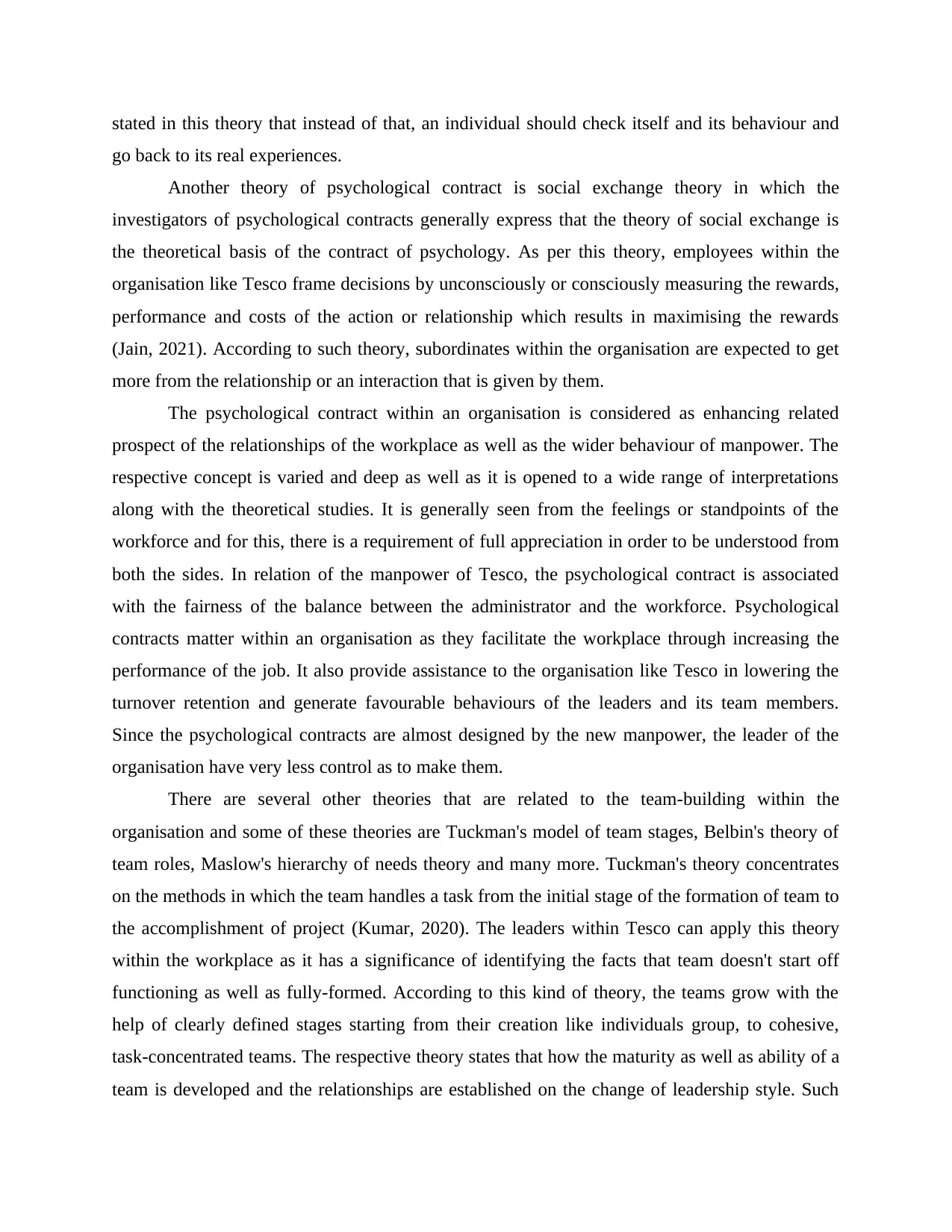
stated in this theory that instead of that, an individual should check itself and its behaviour and
go back to its real experiences.
Another theory of psychological contract is social exchange theory in which the
investigators of psychological contracts generally express that the theory of social exchange is
the theoretical basis of the contract of psychology. As per this theory, employees within the
organisation like Tesco frame decisions by unconsciously or consciously measuring the rewards,
performance and costs of the action or relationship which results in maximising the rewards
(Jain, 2021). According to such theory, subordinates within the organisation are expected to get
more from the relationship or an interaction that is given by them.
The psychological contract within an organisation is considered as enhancing related
prospect of the relationships of the workplace as well as the wider behaviour of manpower. The
respective concept is varied and deep as well as it is opened to a wide range of interpretations
along with the theoretical studies. It is generally seen from the feelings or standpoints of the
workforce and for this, there is a requirement of full appreciation in order to be understood from
both the sides. In relation of the manpower of Tesco, the psychological contract is associated
with the fairness of the balance between the administrator and the workforce. Psychological
contracts matter within an organisation as they facilitate the workplace through increasing the
performance of the job. It also provide assistance to the organisation like Tesco in lowering the
turnover retention and generate favourable behaviours of the leaders and its team members.
Since the psychological contracts are almost designed by the new manpower, the leader of the
organisation have very less control as to make them.
There are several other theories that are related to the team-building within the
organisation and some of these theories are Tuckman's model of team stages, Belbin's theory of
team roles, Maslow's hierarchy of needs theory and many more. Tuckman's theory concentrates
on the methods in which the team handles a task from the initial stage of the formation of team to
the accomplishment of project (Kumar, 2020). The leaders within Tesco can apply this theory
within the workplace as it has a significance of identifying the facts that team doesn't start off
functioning as well as fully-formed. According to this kind of theory, the teams grow with the
help of clearly defined stages starting from their creation like individuals group, to cohesive,
task-concentrated teams. The respective theory states that how the maturity as well as ability of a
team is developed and the relationships are established on the change of leadership style. Such
go back to its real experiences.
Another theory of psychological contract is social exchange theory in which the
investigators of psychological contracts generally express that the theory of social exchange is
the theoretical basis of the contract of psychology. As per this theory, employees within the
organisation like Tesco frame decisions by unconsciously or consciously measuring the rewards,
performance and costs of the action or relationship which results in maximising the rewards
(Jain, 2021). According to such theory, subordinates within the organisation are expected to get
more from the relationship or an interaction that is given by them.
The psychological contract within an organisation is considered as enhancing related
prospect of the relationships of the workplace as well as the wider behaviour of manpower. The
respective concept is varied and deep as well as it is opened to a wide range of interpretations
along with the theoretical studies. It is generally seen from the feelings or standpoints of the
workforce and for this, there is a requirement of full appreciation in order to be understood from
both the sides. In relation of the manpower of Tesco, the psychological contract is associated
with the fairness of the balance between the administrator and the workforce. Psychological
contracts matter within an organisation as they facilitate the workplace through increasing the
performance of the job. It also provide assistance to the organisation like Tesco in lowering the
turnover retention and generate favourable behaviours of the leaders and its team members.
Since the psychological contracts are almost designed by the new manpower, the leader of the
organisation have very less control as to make them.
There are several other theories that are related to the team-building within the
organisation and some of these theories are Tuckman's model of team stages, Belbin's theory of
team roles, Maslow's hierarchy of needs theory and many more. Tuckman's theory concentrates
on the methods in which the team handles a task from the initial stage of the formation of team to
the accomplishment of project (Kumar, 2020). The leaders within Tesco can apply this theory
within the workplace as it has a significance of identifying the facts that team doesn't start off
functioning as well as fully-formed. According to this kind of theory, the teams grow with the
help of clearly defined stages starting from their creation like individuals group, to cohesive,
task-concentrated teams. The respective theory states that how the maturity as well as ability of a
team is developed and the relationships are established on the change of leadership style. Such
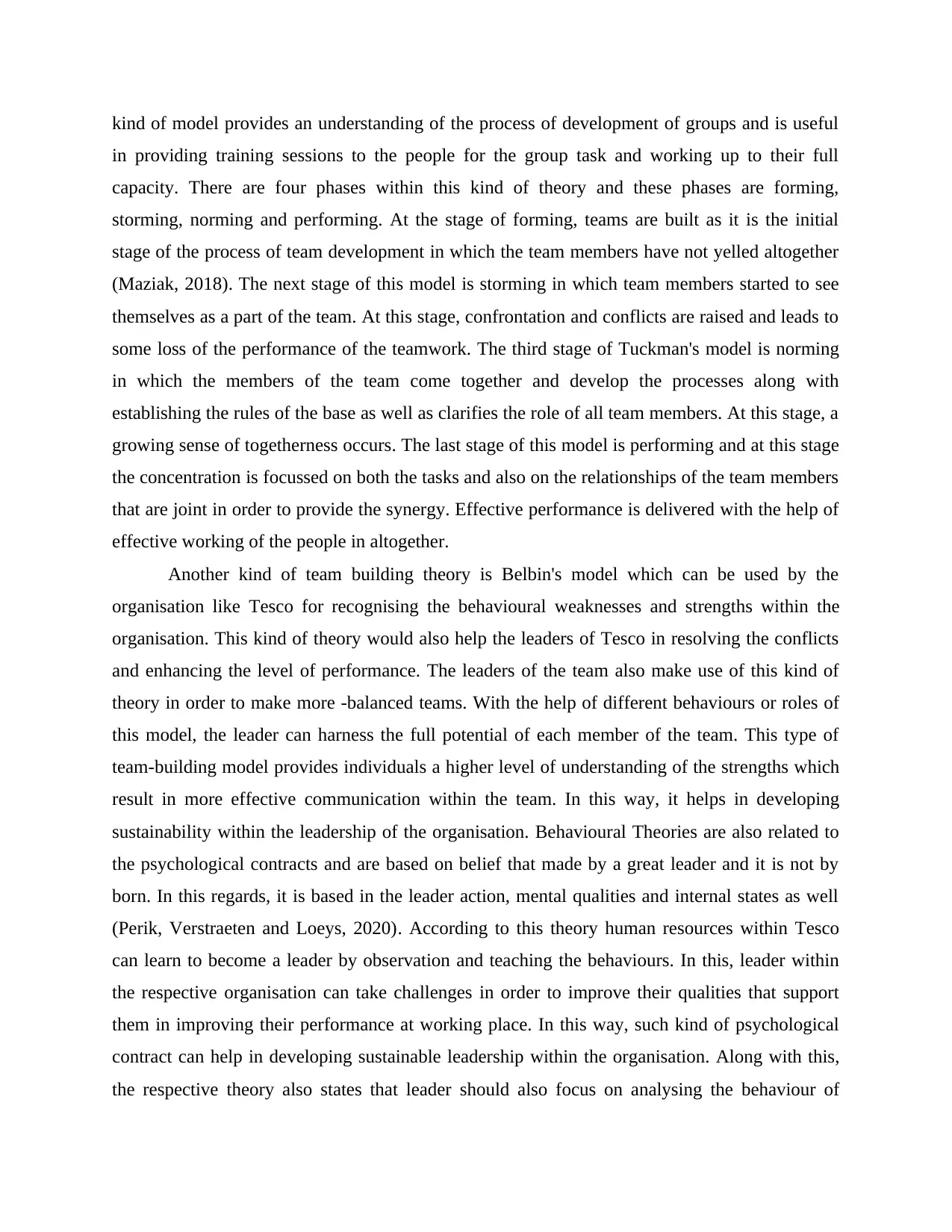
kind of model provides an understanding of the process of development of groups and is useful
in providing training sessions to the people for the group task and working up to their full
capacity. There are four phases within this kind of theory and these phases are forming,
storming, norming and performing. At the stage of forming, teams are built as it is the initial
stage of the process of team development in which the team members have not yelled altogether
(Maziak, 2018). The next stage of this model is storming in which team members started to see
themselves as a part of the team. At this stage, confrontation and conflicts are raised and leads to
some loss of the performance of the teamwork. The third stage of Tuckman's model is norming
in which the members of the team come together and develop the processes along with
establishing the rules of the base as well as clarifies the role of all team members. At this stage, a
growing sense of togetherness occurs. The last stage of this model is performing and at this stage
the concentration is focussed on both the tasks and also on the relationships of the team members
that are joint in order to provide the synergy. Effective performance is delivered with the help of
effective working of the people in altogether.
Another kind of team building theory is Belbin's model which can be used by the
organisation like Tesco for recognising the behavioural weaknesses and strengths within the
organisation. This kind of theory would also help the leaders of Tesco in resolving the conflicts
and enhancing the level of performance. The leaders of the team also make use of this kind of
theory in order to make more -balanced teams. With the help of different behaviours or roles of
this model, the leader can harness the full potential of each member of the team. This type of
team-building model provides individuals a higher level of understanding of the strengths which
result in more effective communication within the team. In this way, it helps in developing
sustainability within the leadership of the organisation. Behavioural Theories are also related to
the psychological contracts and are based on belief that made by a great leader and it is not by
born. In this regards, it is based in the leader action, mental qualities and internal states as well
(Perik, Verstraeten and Loeys, 2020). According to this theory human resources within Tesco
can learn to become a leader by observation and teaching the behaviours. In this, leader within
the respective organisation can take challenges in order to improve their qualities that support
them in improving their performance at working place. In this way, such kind of psychological
contract can help in developing sustainable leadership within the organisation. Along with this,
the respective theory also states that leader should also focus on analysing the behaviour of
in providing training sessions to the people for the group task and working up to their full
capacity. There are four phases within this kind of theory and these phases are forming,
storming, norming and performing. At the stage of forming, teams are built as it is the initial
stage of the process of team development in which the team members have not yelled altogether
(Maziak, 2018). The next stage of this model is storming in which team members started to see
themselves as a part of the team. At this stage, confrontation and conflicts are raised and leads to
some loss of the performance of the teamwork. The third stage of Tuckman's model is norming
in which the members of the team come together and develop the processes along with
establishing the rules of the base as well as clarifies the role of all team members. At this stage, a
growing sense of togetherness occurs. The last stage of this model is performing and at this stage
the concentration is focussed on both the tasks and also on the relationships of the team members
that are joint in order to provide the synergy. Effective performance is delivered with the help of
effective working of the people in altogether.
Another kind of team building theory is Belbin's model which can be used by the
organisation like Tesco for recognising the behavioural weaknesses and strengths within the
organisation. This kind of theory would also help the leaders of Tesco in resolving the conflicts
and enhancing the level of performance. The leaders of the team also make use of this kind of
theory in order to make more -balanced teams. With the help of different behaviours or roles of
this model, the leader can harness the full potential of each member of the team. This type of
team-building model provides individuals a higher level of understanding of the strengths which
result in more effective communication within the team. In this way, it helps in developing
sustainability within the leadership of the organisation. Behavioural Theories are also related to
the psychological contracts and are based on belief that made by a great leader and it is not by
born. In this regards, it is based in the leader action, mental qualities and internal states as well
(Perik, Verstraeten and Loeys, 2020). According to this theory human resources within Tesco
can learn to become a leader by observation and teaching the behaviours. In this, leader within
the respective organisation can take challenges in order to improve their qualities that support
them in improving their performance at working place. In this way, such kind of psychological
contract can help in developing sustainable leadership within the organisation. Along with this,
the respective theory also states that leader should also focus on analysing the behaviour of
⊘ This is a preview!⊘
Do you want full access?
Subscribe today to unlock all pages.

Trusted by 1+ million students worldwide
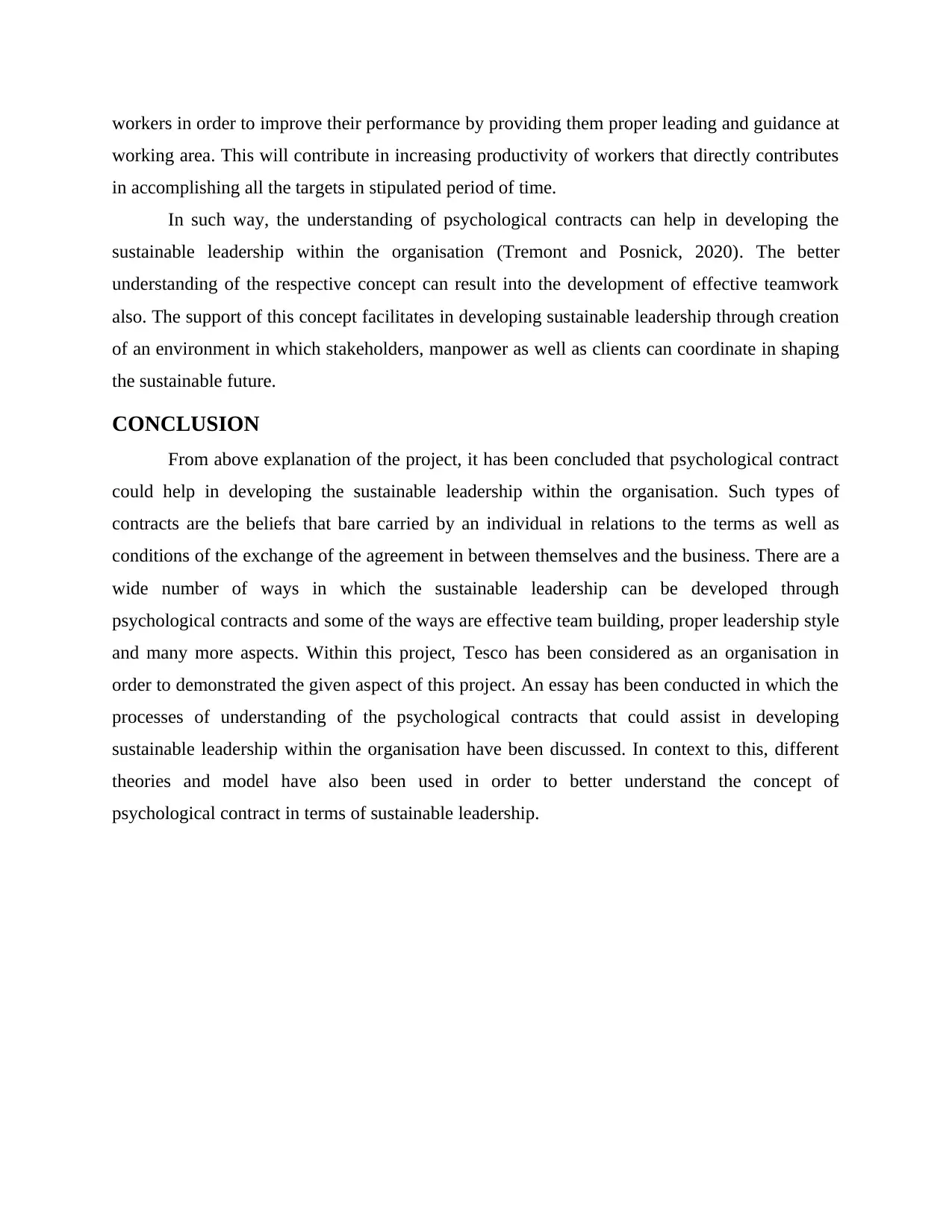
workers in order to improve their performance by providing them proper leading and guidance at
working area. This will contribute in increasing productivity of workers that directly contributes
in accomplishing all the targets in stipulated period of time.
In such way, the understanding of psychological contracts can help in developing the
sustainable leadership within the organisation (Tremont and Posnick, 2020). The better
understanding of the respective concept can result into the development of effective teamwork
also. The support of this concept facilitates in developing sustainable leadership through creation
of an environment in which stakeholders, manpower as well as clients can coordinate in shaping
the sustainable future.
CONCLUSION
From above explanation of the project, it has been concluded that psychological contract
could help in developing the sustainable leadership within the organisation. Such types of
contracts are the beliefs that bare carried by an individual in relations to the terms as well as
conditions of the exchange of the agreement in between themselves and the business. There are a
wide number of ways in which the sustainable leadership can be developed through
psychological contracts and some of the ways are effective team building, proper leadership style
and many more aspects. Within this project, Tesco has been considered as an organisation in
order to demonstrated the given aspect of this project. An essay has been conducted in which the
processes of understanding of the psychological contracts that could assist in developing
sustainable leadership within the organisation have been discussed. In context to this, different
theories and model have also been used in order to better understand the concept of
psychological contract in terms of sustainable leadership.
working area. This will contribute in increasing productivity of workers that directly contributes
in accomplishing all the targets in stipulated period of time.
In such way, the understanding of psychological contracts can help in developing the
sustainable leadership within the organisation (Tremont and Posnick, 2020). The better
understanding of the respective concept can result into the development of effective teamwork
also. The support of this concept facilitates in developing sustainable leadership through creation
of an environment in which stakeholders, manpower as well as clients can coordinate in shaping
the sustainable future.
CONCLUSION
From above explanation of the project, it has been concluded that psychological contract
could help in developing the sustainable leadership within the organisation. Such types of
contracts are the beliefs that bare carried by an individual in relations to the terms as well as
conditions of the exchange of the agreement in between themselves and the business. There are a
wide number of ways in which the sustainable leadership can be developed through
psychological contracts and some of the ways are effective team building, proper leadership style
and many more aspects. Within this project, Tesco has been considered as an organisation in
order to demonstrated the given aspect of this project. An essay has been conducted in which the
processes of understanding of the psychological contracts that could assist in developing
sustainable leadership within the organisation have been discussed. In context to this, different
theories and model have also been used in order to better understand the concept of
psychological contract in terms of sustainable leadership.
Paraphrase This Document
Need a fresh take? Get an instant paraphrase of this document with our AI Paraphraser
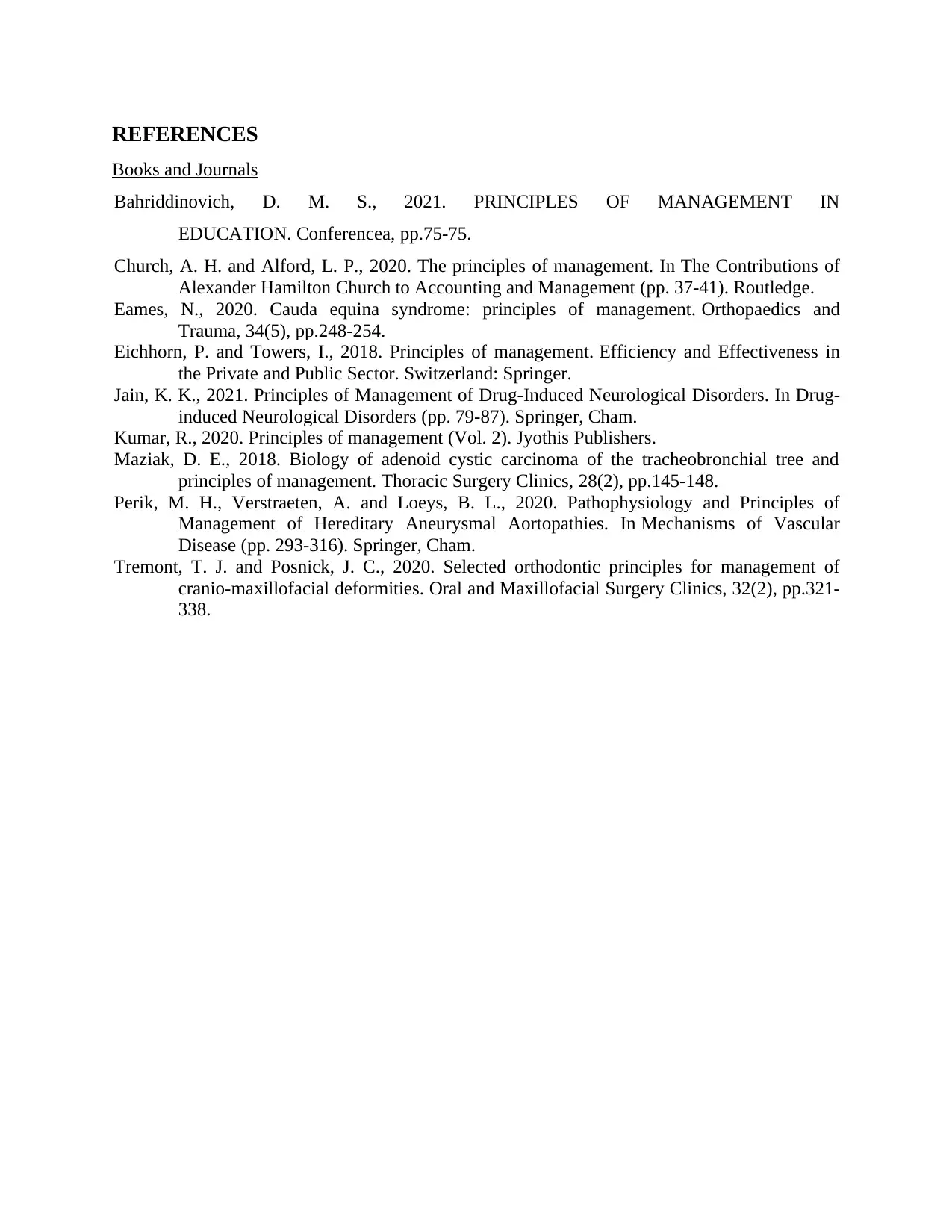
REFERENCES
Books and Journals
Bahriddinovich, D. M. S., 2021. PRINCIPLES OF MANAGEMENT IN
EDUCATION. Conferencea, pp.75-75.
Church, A. H. and Alford, L. P., 2020. The principles of management. In The Contributions of
Alexander Hamilton Church to Accounting and Management (pp. 37-41). Routledge.
Eames, N., 2020. Cauda equina syndrome: principles of management. Orthopaedics and
Trauma, 34(5), pp.248-254.
Eichhorn, P. and Towers, I., 2018. Principles of management. Efficiency and Effectiveness in
the Private and Public Sector. Switzerland: Springer.
Jain, K. K., 2021. Principles of Management of Drug-Induced Neurological Disorders. In Drug-
induced Neurological Disorders (pp. 79-87). Springer, Cham.
Kumar, R., 2020. Principles of management (Vol. 2). Jyothis Publishers.
Maziak, D. E., 2018. Biology of adenoid cystic carcinoma of the tracheobronchial tree and
principles of management. Thoracic Surgery Clinics, 28(2), pp.145-148.
Perik, M. H., Verstraeten, A. and Loeys, B. L., 2020. Pathophysiology and Principles of
Management of Hereditary Aneurysmal Aortopathies. In Mechanisms of Vascular
Disease (pp. 293-316). Springer, Cham.
Tremont, T. J. and Posnick, J. C., 2020. Selected orthodontic principles for management of
cranio-maxillofacial deformities. Oral and Maxillofacial Surgery Clinics, 32(2), pp.321-
338.
Books and Journals
Bahriddinovich, D. M. S., 2021. PRINCIPLES OF MANAGEMENT IN
EDUCATION. Conferencea, pp.75-75.
Church, A. H. and Alford, L. P., 2020. The principles of management. In The Contributions of
Alexander Hamilton Church to Accounting and Management (pp. 37-41). Routledge.
Eames, N., 2020. Cauda equina syndrome: principles of management. Orthopaedics and
Trauma, 34(5), pp.248-254.
Eichhorn, P. and Towers, I., 2018. Principles of management. Efficiency and Effectiveness in
the Private and Public Sector. Switzerland: Springer.
Jain, K. K., 2021. Principles of Management of Drug-Induced Neurological Disorders. In Drug-
induced Neurological Disorders (pp. 79-87). Springer, Cham.
Kumar, R., 2020. Principles of management (Vol. 2). Jyothis Publishers.
Maziak, D. E., 2018. Biology of adenoid cystic carcinoma of the tracheobronchial tree and
principles of management. Thoracic Surgery Clinics, 28(2), pp.145-148.
Perik, M. H., Verstraeten, A. and Loeys, B. L., 2020. Pathophysiology and Principles of
Management of Hereditary Aneurysmal Aortopathies. In Mechanisms of Vascular
Disease (pp. 293-316). Springer, Cham.
Tremont, T. J. and Posnick, J. C., 2020. Selected orthodontic principles for management of
cranio-maxillofacial deformities. Oral and Maxillofacial Surgery Clinics, 32(2), pp.321-
338.
1 out of 8
Related Documents
Your All-in-One AI-Powered Toolkit for Academic Success.
+13062052269
info@desklib.com
Available 24*7 on WhatsApp / Email
![[object Object]](/_next/static/media/star-bottom.7253800d.svg)
Unlock your academic potential
Copyright © 2020–2026 A2Z Services. All Rights Reserved. Developed and managed by ZUCOL.





